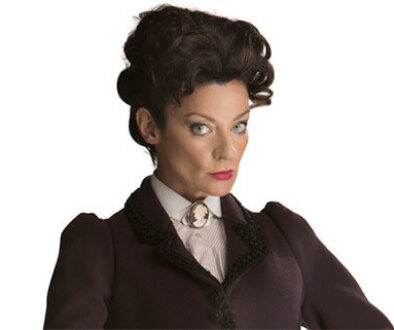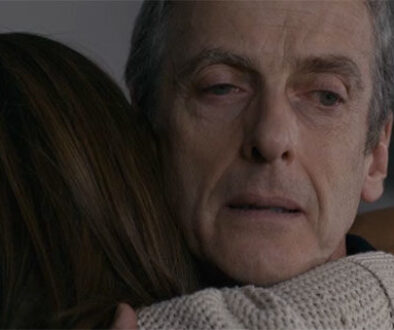Death in Heaven Review (Part 2): Questions, Questions
Clint Hassell concludes his review on the final episode of Series 8.

“Death in Heaven” may be showrunner Steven Moffat’s most straight-forward series finale yet. However, despite lacking his signature plot twists or a time-tangled narrative, the episode still raises questions about both Doctor Who’s creation and internal mythology. So, just as last year, I hereby call to order a meeting of the Doctor Who Book Club. Grab a cup of coffee – sorry, but we’re out of Jammie Dodgers – and let’s begin the discussion!
Why the altered opening credits sequence?
 Clara exclaiming, “I’m the Doctor!” in the pre-credits teaser revisits Series 7’s storyline questioning the identity of the “Impossible Girl.” Not only has this plot point been practically forgotten since “Deep Breath,” the rouse recalls Amy’s speech to newborn Melody Pond, in Series 6’s “A Good Man Goes to War,” which purposely tricked the audience into thinking that the Doctor might be Melody’s father.
Clara exclaiming, “I’m the Doctor!” in the pre-credits teaser revisits Series 7’s storyline questioning the identity of the “Impossible Girl.” Not only has this plot point been practically forgotten since “Deep Breath,” the rouse recalls Amy’s speech to newborn Melody Pond, in Series 6’s “A Good Man Goes to War,” which purposely tricked the audience into thinking that the Doctor might be Melody’s father.
It takes teams of lawyers, agents, and producers to hash out a change in cast order in the credits, so the switch must’ve been viewed as important for some reason. Yet, while the one-off credits look fantastic – much better than the changed-weekly (or is that, “weakly changed”?) credits from the first half of Series 7 – they seem altered only to capitalize on a brief joke from the teaser. Could this have been Peter Capaldi’s way of thanking the departing actress who came before him and eased his transition into the role? Or, was this Moffat’s response to fandom’s continual Clara Who jokes?
Should “Death in Heaven” have included Gran?
 One of the biggest changes Russell T Davies made in revising Doctor Who for the modern era was introducing the companion’s families as major recurring characters. In addition to further developing Rose, Martha, and Donna as relatable, multi-faceted characters, the practice allowed the narrative to frequently return to Earth, often in episodes where the planet’s safety is threatened. For example, in “Army of Ghosts”/“Doomsday,” the terror of the Cybermen invasion is apparent as the audience sees it through Jackie Tyler’s eyes. Considering the threat of the Cybermen is distinctly muted in “Death in Heaven,” being portrayed in news broadcast footage notable for being almost completely Cybermen-free, would the episode have benefitted from depicting the invasion from the Oswald’s (or – shudder – the Maitland’s) point of view?
One of the biggest changes Russell T Davies made in revising Doctor Who for the modern era was introducing the companion’s families as major recurring characters. In addition to further developing Rose, Martha, and Donna as relatable, multi-faceted characters, the practice allowed the narrative to frequently return to Earth, often in episodes where the planet’s safety is threatened. For example, in “Army of Ghosts”/“Doomsday,” the terror of the Cybermen invasion is apparent as the audience sees it through Jackie Tyler’s eyes. Considering the threat of the Cybermen is distinctly muted in “Death in Heaven,” being portrayed in news broadcast footage notable for being almost completely Cybermen-free, would the episode have benefitted from depicting the invasion from the Oswald’s (or – shudder – the Maitland’s) point of view?
Who is the Doctor’s fourth wife?
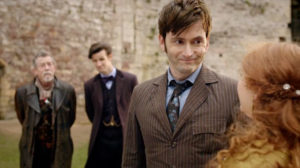 In detailing the Doctor’s life to the Cybermen, Clara mentions that the Doctor has been “married four times, all deceased.” On screen, we’ve seen the Doctor marry Marilyn Monroe (“A Christmas Carol”), River Song (“The Wedding of River Song”), and Queen Elizabeth I (“The Day of the Doctor”). Considering that the character of Susan was reconceived as the Doctor’s granddaughter, in order to avoid any sense of impropriety, surely wife #4 is meant to be Susan’s grandmother. Or, is Moffat using this as an opportunity to legitimize expanded Whoniverse stories – much like “The Night of the Doctor” canonized Eight’s Big Finish adventures – this time the 2001 novel, The Adventuress of Henrietta Street?
In detailing the Doctor’s life to the Cybermen, Clara mentions that the Doctor has been “married four times, all deceased.” On screen, we’ve seen the Doctor marry Marilyn Monroe (“A Christmas Carol”), River Song (“The Wedding of River Song”), and Queen Elizabeth I (“The Day of the Doctor”). Considering that the character of Susan was reconceived as the Doctor’s granddaughter, in order to avoid any sense of impropriety, surely wife #4 is meant to be Susan’s grandmother. Or, is Moffat using this as an opportunity to legitimize expanded Whoniverse stories – much like “The Night of the Doctor” canonized Eight’s Big Finish adventures – this time the 2001 novel, The Adventuress of Henrietta Street?
“All of time and space. . . . Just something for your bucket list.”
Was it too much to hope for a smart, kinda nerdy, unconventionally pretty, already beloved character as a companion?

Is Missy wearing a sonic bracelet?
Using the bracelet, Missy seemingly causes Boat One to lurch out of control, its cargo bay doors to open, and the Cybermen to attack. Having the bracelet be her version of the Doctor’s sonic screwdriver would actually be a really good explanation as to how she escapes her handcuffs with such ease, and would continue the canon’s slightly sexist use of “feminine” sonic items for girls (lipsticks, hatpins, gloves, etc. – which, in fairness, makes them easier to conceal, meaning that Sarah Jane isn’t always having to explain the piece of alien tech in her purse), while more masculine characters get tools like screwdrivers, spanners, and lorgnettes.
Can we reconcile Missy’s previous cameos with her explanation in “Death in Heaven”?
 In the finale, Missy claims that she has been “up and down [the Doctor’s] timeline meeting all those silly people who died keeping [him] alive.” Seeing as how he was a Clockwork Droid, was the Half-Face Man ever really alive of his own accord? Did he even have a soul to upload to the Nethersphere? Why capture Gretchen’s mind, as her body had been miniaturized, atomized by Dalek antibodies, and is now in outer space (and possibly another time)? Are we to assume that some minds were indiscriminately downloaded to random Cyberman bodies? Did the guard in “The Caretaker” die for the Doctor, seeing as how they never met?
In the finale, Missy claims that she has been “up and down [the Doctor’s] timeline meeting all those silly people who died keeping [him] alive.” Seeing as how he was a Clockwork Droid, was the Half-Face Man ever really alive of his own accord? Did he even have a soul to upload to the Nethersphere? Why capture Gretchen’s mind, as her body had been miniaturized, atomized by Dalek antibodies, and is now in outer space (and possibly another time)? Are we to assume that some minds were indiscriminately downloaded to random Cyberman bodies? Did the guard in “The Caretaker” die for the Doctor, seeing as how they never met?
How did Missy return from Gallifrey? Why does the Master no longer look like John Simm?
While the narrative has slyly hinted at the answers – the hand gripping the frame as Clara climbs out of the Gallifreyan painting in “The Day of the Doctor” is clearly not Jenna Coleman’s; as punishment for having stopped them from escaping the Time War, in The End of Time, the High Council probably forced a regeneration upon the Master, much like they did upon the Second Doctor – not actually seeing the events is unsatisfying.

Lightning round!
- If Missy is the “woman in the shop,” then why does Clara not recognize her, when they meet in “Dark Water”? Given the importance of the character, that seems unlikely, even given Clara’s preoccupied nature in “The Bells of Saint John.”
- Is there any indication in “Death in Heaven” – a date on a newspaper or Danny’s autopsy report, for example – that would reveal the Doctor’s actual birthday?
- Which is the greater offense: reconceiving the Cybermen as zombies, in “Death in Heaven,” or portraying the Weeping Angels as visibly moving neck breakers, in “The Time of Angels”/“Flesh and Stone”?
- Osgood spends a great deal of time examining Missy’s laser device (which, sadly, is not a laser screwdriver, but still references the Master’s affinity for lasers). Could there be a narrative loop-hole in Osgood’s death?
- If Danny’s dead, and Clara isn’t already pregnant, then how does one explain Orson Pink? Surely, “Listen” hasn’t been overwritten, as Clara’s actions are responsible for determining the Doctor’s personality and heroic destiny.
Is this a fitting ending for the Brig?
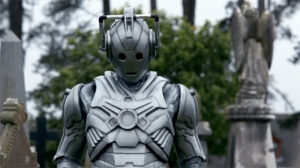 Despite both Clara and the Doctor being willing, it is the Brig who murders Missy, meaning the ultimate hero of the adventure is a character unseen on Doctor Who in 25 years. After a brief salute, the Brig’s Cyberman avatar flies off to . . . do what? He doesn’t explode, so, apparently there’s still a cyber-converted Brigadier out there. Is he as miserable as Cyber-Danny was? Is this really a better ending for such a beloved character than the marvelously affecting tribute to the Brig, in “The Wedding of River Song”?
Despite both Clara and the Doctor being willing, it is the Brig who murders Missy, meaning the ultimate hero of the adventure is a character unseen on Doctor Who in 25 years. After a brief salute, the Brig’s Cyberman avatar flies off to . . . do what? He doesn’t explode, so, apparently there’s still a cyber-converted Brigadier out there. Is he as miserable as Cyber-Danny was? Is this really a better ending for such a beloved character than the marvelously affecting tribute to the Brig, in “The Wedding of River Song”?
Also, why have there been multiple mentions of Nicholas Courtney’s character, but no in-story tribute to the character played by Elisabeth Sladen?
Why doesn’t the Doctor tell Danny how to resurrect himself using Missy’s Magic Plot Device Bracelet?
By giving Danny the bracelet, the Doctor, in his way, saves Clara’s boyfriend. However, by not telling Danny how to use it, he ensures that “P.E.” can only return to life if he is inquisitive and resourceful – characteristics that the Doctor values. Considering that the two practically fight for Clara’s affections throughout Series 8, could it be that the Doctor intentionally guarantees that Danny can only return to Clara after proving his worth, and becoming more Doctor-like?
Further . . .
Rather than returning himself, Danny resurrects the boy he inadvertently killed – which is the right thing to do, yes? Except, what happens to this kid? Most likely, he doesn’t speak English, he’s thousands of miles from home, and he’s been dead for “many years,” so his family will freak the [bleep] out when he reappears, alive. Clara obviously doesn’t ask the Doctor for help, so, is she back to being a nanny, now? A foster kid is a lousy parting gift.

Will a Moffat-era companion ever leave on good terms and better for the experience?
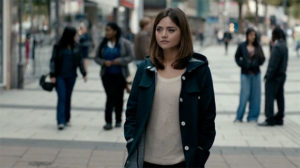
Continuing that thought . . .
Knowing that Clara is in the Christmas special, is there any way – short of holiday magic that resurrects Danny and melts her cold, controlling heart – to “fix” the character, or is she a lost cause? Could Christmas bring a Clara that differs as much from Series 8 and that Clara did from Series 7? Or, perhaps the Doctor will discover another time-splintered echo, a la Oswin or the Victorian-era Clara?
Does having a female Master help or hurt the prospects of a female Doctor?
Michelle Gomez really should be commended, as it is rare to see an actress give herself over so completely in portraying such an unlikeable character. She has received acclaim from fans and critics alike, with many commenting that she “made the role her own.”
Make no mistake: a female Doctor is inevitable, even if only to increase interest in a ratings-starved show, many years from now. Is Missy (and Clara’s turn as the Doctor, in “Flatline”) Moffat’s way of testing the viewers’ response to a female Time Lord, or his way of distracting the audience while he circumvents the issue?




